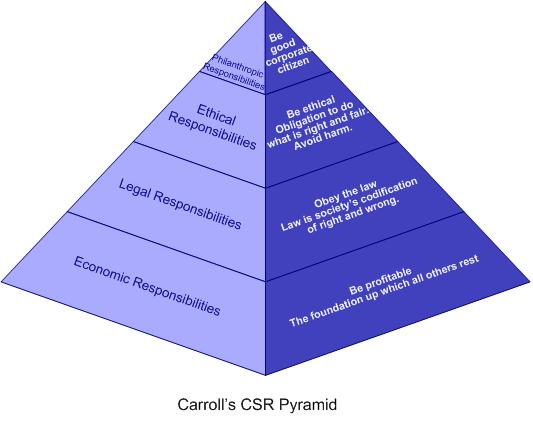Corporate Social Responsibility

Carroll’s CSR Pyramid. According to Carroll (1983:608), “corporate social responsibility involves the conduct of a business so that it is economically profitable, law abiding, ethical and socially supportive. To be socially responsible then means that profitability and obedience to the law are foremost conditions when discussing the firm’s ethics and the extent to which it supports the society in which it exists with contributions of money, time and talent”. And the different layers in the pyramid help managers see the different types of obligations that society expects of businesses. Adopted from: www.csrquest.net/imagefiles/CSR%20Pyramid.jpg Economic responsibility in Carroll’s CSR Pyramid : It concerns the responsibility of business of producing goods and services needed by society and selling them making a profit. Novak (1996) has contributed to this are by defining seven responsibilities of companies. Companies have shareholders who demand a reasonable return on their investments, they have employees who want safe and fairly paid jobs, and they have customers who demand good quality products at a fair price. So, here comes the first responsibility of the business as it is to be a properly functioning economic unit and stay in business. And this is the base of the pyramid, where all the other layers rest on. Legal responsibility in Carroll’s CSR Pyramid : the legal responsibility of corporations demands that businesses abide by the law and play by the rules of the game. Should companies choose to “bend” or even ignore their legal responsibilities the price can be very high for the business. And US software giant Microsoft has faced a long running anti-trust case in Europe for abusing its monopolistic position to disadvantage its competitors which resulted in tough settlements against the company. Ethical Responsibility in Carroll’s CSR Pyramid : the main concept of ethical responsibility as defined and expressed by Carroll (1991) is that the ethical responsibility consists…
Nowadays Corporate Social Responsibility (CSR) has become an essential part of big, multinational corporations without which any corporation of a substantial size would face difficulties from various fronts – non-government organizations, governments, public (including existing and potential customers), and even workforce itself. People justifiably reason that since global multicultural corporations are earning revenues which are calculated at millions, or even billions of pounds, they are expected to give something back to the community they are operating in or to the wider community to compensate for a wide range of inconveniences and difficulties the operation of the business is causing to local community, nature or the wider area. However, if it is expected from big companies in UK and everywhere to exercise social responsibility in addition their primary function, which is profit maximisation, what should be, the stance of small and medium business in UK regarding giving back something to the community. Opinions differ regarding whether it is expected from small and medium businesses in UK to engage in CSR. Some argue that since small and medium business in UK do not possess large amount of funds that could be spent for the purpose, and even if the business is making any negative impact on local community, be it damaging the nature, exploiting natural resources, or anything else, such an impact would not be substantial enough for the business to reimburse it. Others, on the other hand, insist that corporate social responsibility has to be practiced by all business in UK– small, medium or big, and since a business is making money it should give back. “A business that accepts Corporate Responsibility will be prepared to be responsible for and willing to justify its actions. It will also consider the impact of its actions on a variety of individuals and groups,…

Johnson, Scholes and Whittington (2006) state that Corporate Social Responsibility is concerned with the ways in which an organisation exceeds the minimum obligations to stakeholders specified through regulation and corporate governance. As we have to analyse the CSR in multinational company, we have to closely analyse the CSR approaches in Global level and sometimes in the country specific level. Furthermore, they also indicate that social responsibility which will have universal elements whilst also being applicable to many different localities. As the actions of companies in one country may have an impact on other countries (pollution control or trading practices), there is an increasing need to look at the global impact of an organization’s strategies (Johnson, Scholes and Whittington 2006). Moreover, Gray et al (2007:789) indicate that a business that accepts Corporate Social Responsibility will be prepared to be responsible for and willing to justify its actions. It will also consider the impact of its actions on a variety of individuals and groups, both inside and outside the organization. It is claimed that the organizations have social and environmental reporting where they report their accountability to all stakeholders and other interested parties. This is referred as silent reports. However, the reports which are produced by external sources such as newspapers, magazines and other research institutions are referred as shadow accounts or reporting where if the silent accounts are in line with the silent reports. There are some methods to encourage the Corporate Social Responsibility as mentioned by Gray (2007). Government Intervention: Governments can intervene directly to ensure that a business accepts the consequences of its behaviour. One of the most common methods of achieving this is through the creation of legislation which businesses must adhere to. This could be for the businesses to reduce their carbon footprint by certain percentage…

Some of the secondary data authors have formulated their recommendations for businesses in terms of engaging in CSR activities with an increased level of efficiency. Most noteworthy recommendations are proposed by Jonker and Witte (2006), Asongu (2007), Bacher (2007), Schreck (2009), Hawkins (2009), Schwartz (2011) and others. Reasoning about the importance of engaging in CSR activities for businesses Schreck (2009) states that “although beyond compliance firm behaviour might be a good indicator for socially responsible behaviour, it is critical to assume that CSR starts only where the law ends” (Schreck, 2009, p.11). Secondary data authors also highlight the importance of sources of CSR principles and policies for businesses. “Sources of corporate social responsibilities are, for example, business principles that were developed by supranational organisations or are derived from international conferences, such as the Caux Round Table Business Principles. These Codes of Conduct are not legally binding” (Bacher, 2007, p.9). Jonker and Witte (2006) formulate following recommendations for businesses in order to engage in CSR activities with an increased level of efficiency: a) Achieving increased level of cooperation between the various departments of the business in terms of achieving CSR related aims and objectives; b) Engagement in strategic use of social investment budget; c) Introducing CSR aspects of the business at the initial stages of the project and integrating it with long-term aims and objectives; d) Specifying the activities of stakeholder identification and engagement as a continuous process; e) Ensuring the existence of CSR skills in all employees within the organisation; f) Implementing an effective audit/review system in terms of improving the quality of CSR. Some of the authors of secondary data sources like Johnson et al (2008) and Mullerat (2010) stress the role of government in regulating CSR-related issues. A specific recommendation formulated in that aspect states that “governments have…

The concept of CSR has attracted a range of criticisms from some secondary data authors. It is important to note that “sceptics and opponents find their support in their assertion that beyond good intentions and turns of phase firms must account for reality. A reality characterised by hypercompetition and strong pressure to cut costs, compelling firms do search desperately for growth opportunities, leves no room for initiatives consistent with the CSR philosophy” (Perrini et al, 2006, p.6). Milton Friedman can be pinpointed as one of the most notable opponents of CSR concept. Schwartz (2010) mentions the Freedman’s (1962) viewpoint which states that “there is one and only one social responsibility of business – to use its resources and engage in activities designed to increase its profits so long as it stays within the rules of the game, which is to say, engages in open and free competition without deception and fraud” (Schwartz, 2010, p.52). Generally, criticism associated with the concept of CSR can be divided into the following five groups: Firstly, CSR allows businesses to project positive image by doing very little. Such type of criticism has been mentioned in the works of Mullerat (2009) and Aras and Crowther (2010). According to this viewpoint businesses can engage in CSR-related activities in a minimum manner, but still they can create highly positive brand image for the company by publicising their CSR efforts. Secondly, the level of publicity associated with the concept of CSR creates an impression that the majority of businesses are seriously engaged in CSR-related activities, whereas the reality is quite different. This issue has been discussed by Freitag (2008), Mullerat (2009), Aras and Crowther (2010) and others. Specifically, the authors state that increased level of coverage of CSR issues by various types of media tends to form an impression…

Mohr et al (2010) divide distinctive profiles of CSR practices into three categories: business case, social values, and syncretic stewardship. The business case model of CSR “is driven primarily by the ability of CSR initiatives to create positive business results. Because serving shareholders is paramount, a strong tie to the economic outcomes drives CSR initiatives” (Mohr et al, 2010, p.440). Companies operating under business case model usually adopt reactive approach towards CSR issues and may engage in such activities due to the pressure form various groups, or in the search of competitive edge. Social values model of CSR, on the other hand, involves companies associating with a specific social cause and “it is integrated into the organisational fiber in every way: visible symbols of the cause can be found everywhere in the company” (Mohr et al, 2010, p.441). Businesses operating under syncretic stewardship CSR model aim to harmonise and balance the demands of various stakeholders of he business. In other words, these companies focus on profit maximisation objective of the business as the business case model, but at the same time, they also comprehend the importance of CSR and aim to address it an an effective manner. Four approaches to CSR have been specified by Tudler and Zwart (2006) as inactive, reactive, active and proactive (interactive). It is important to note that “these approaches emerged at different stages of societal development and they are neither mutually exclusive nor do they represent ‘best’ practice models” (Tulder and Zwart, 2006, p.143) The following table illustrates the viewpoints associated with each individual CSR approach: Inactive Reactive Active Pro-/interactive ‘Corporate self-responsibility’ ‘Corporate social responsiveness’ ‘Corporate social responsibility’ ‘Corporate societal responsibility’ Inside-in Outside-in Inside-out In/outside-in/out ‘Doing things right’ ‘Don’t do things wrong’ ‘Doing the right things’ ‘Doing the right things right’ ‘Doing well’ ‘Doing well…

Corporate Social Responsibility (CSR) has become one of the most important aspects of a business practice that companies cannot afford to ignore. It needs to be specified that “CSR is concerned with treating the stakeholders of the firm ethically or in a responsible manner” (Hopkins, 2007, p.15). It can be stated that the importance of CSR increases with the size of the company due to the fact that in large companies any CSR related issues will attract wider media coverage and accordingly will have greater implications. This article analyses one of the most important aspects of CSR, being responsible towards the natural environment of host country in case of BP Plc, a global oil and gas company based in London, UK. The article starts with the outline of the company, followed by the analysis of CSR issues BP is facing in host countries. Also measures required to be undertaken by BP in order to address CSR challenges effectively are described in the paper, as well as the limitations of acknowledged measures are acknowledged. BP Company Outline BP is an international oil and gas company that operates in more than 80 countries under two segments: exploration and production, and refining and marketing (Reuters, 2011, online) The company has more than 79,000 employees globally that are working on 22,100 retail sites, 14 wholly or partly owned refineries and producing 2,426 barrels of oil per day (BP at a Glance, 2011, online). Steffy (2010) informs about mergers and acquisitions engaged by BP with a range of companies especially highlighting the merger with Amoco in 1998, and the acquisition of Arco in 2000 and states that these events became factors contributing to the current size and state of the company. BP is engaged in CSR initiatives intensively, promoting the projects related to the renewable…

What is the objective of any corporation or firm in business world? The obvious answer is that the objective of any business is to maximize its revenues and to make money for its shareholders. It is a very important objective and if a business corporation fails to achieve that objective of making money for shareholders its share prices will go down, it will have a bad reputation and unless radical changes are implemented in order to improve things the business corporation will not be around any more- it will go bankrupt. Corporate Social Responsibility- what is it? As Wikipedia.org defines it “Corporate social responsibility is an expression used to describe what some see as a company’s obligation to be sensitive to the needs of all of the stakeholders in its business operations”. Company’s stakeholders are its employees, customers, suppliers, community organizations, subsidiaries and affiliates, joint venture partners, local neighborhoods, investors, and shareholders (or a sole owner if the case is). “A business that accepts Corporate Responsibility will be prepared to be responsible for and willing to justify its actions. It will also consider the impact of its actions on a variety of individuals and groups, both inside and outside of the organization”. (Hall, Jones, Raffe p.789) A more simplified definition of CSR in this report is how businesses manage their operations to produce positive impact on society. Today, in a highly competitive business world it is extremely important for companies, especially big corporations to build up reputation of a company which cares about nature, problems of society in present day, environmental issues and which deals fairly with its customers, suppliers and employees. For example, a mobile phone business will try to provide as wide coverage as possible for its customers. However, in order to do so, it is likely…
